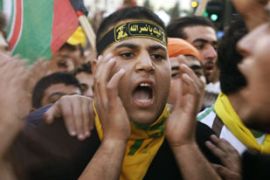More troops deployed in Beirut
Lebanon’s army deploys extra troops in Beirut amid ongoing demonstrations.

Veto power
The Shia group Hezbollah, which is backed by Syria and Iran, and its allies in the opposition are holding an indefinite sit-in to force Siniora’s resignation.
Thousands of protesters spent a third night in a newly-built tent city in central Beirut outside the main government complex where Siniora was spending his days and nights.
Many banks and businesses were again closed on Monday in central Beirut, Lebanon‘s banking and commercial centre.
Business owners in the area have said that lengthy closures could devastate several businesses and force employers to cut jobs.
The opposition, which includes some Christians, has been demanding effective veto power in the government, which has a majority comprising of anti-Syrian politicians from Christian, Sunni and Druze parties.
Six opposition ministers resigned from the cabinet last month after unity talks collapsed. But the depleted government approved plans for the al-Hariri tribunal, sparking the latest protests.
Skirmishes
Al Jazeera’s Hashem Ahelbarra reported that the several other skirmishes between rival protesters were quickly put down by security forces.
Protesters are still camping in tents close to the Lebanese cabinet offices in central Beirut.
|
“When they are convinced that there is no solution except through dialogue, then welcome” Walid Jumblatt, Druze leader |
“We are not letting [the ministers] sleep, we’re disturbing them with our noise. We have the resilience to stay not for one month, but a year or two,” said one protester.
Amid the protests, Amr Moussa, secretary general of the Arab League, arrived in Beirut to meet Lebanese officials.
Moussa said Arab countries could not afford to be bystanders.
He said: “The stability of Lebanon and moving towards a solution that would bring about a sure future for the country is one of our concerns.”
“All of us are worried about the situation in Lebanon.”
Government supporters, who held their own mass funeral procession following the assassination of Pierre Gemayel, a member of the Lebanese majority coalition, stayed away from central Beirut on their leaders’ advice.
Walid Jumblatt, a member of the majority March 14 Forces alliance and de facto leader of Lebanon’s Druze Muslim community, said: “We will be steadfast, peacefully and democratically. We are here, and when they are convinced that there is no solution except through dialogue, then welcome.”
Despite the protest, the city’s annual marathon went ahead. Runners used suburban roads to skirt the demonstration.
Syrian influence
The opposition has been demanding veto power in the government, whose majority comprises politicians from Christian, Sunni Muslim and Druze parties.
Hezbollah receives financial and logistical support from Iran and Syria, while most members of the majority March 14 Forces coalition are opposed to Syrian influence in Lebanon.
Syrian troops and security pulled out of Lebanon in April 2005 following street demonstrations in the wake of the assassination of Rafiq al-Hariri, a former Lebanese prime minister.
Politicians in the majority coalition say the opposition only wants to weaken the government and derail a UN tribunal that would try those suspected of involvement in the al-Hariri killing.
A preliminary UN inquiry has implicated Syrian and Lebanese security officials in the killing.
Six opposition ministers resigned from the cabinet last month after talks on national unity collapsed. But the depleted government approved plans for the tribunal, leading to the latest protests.